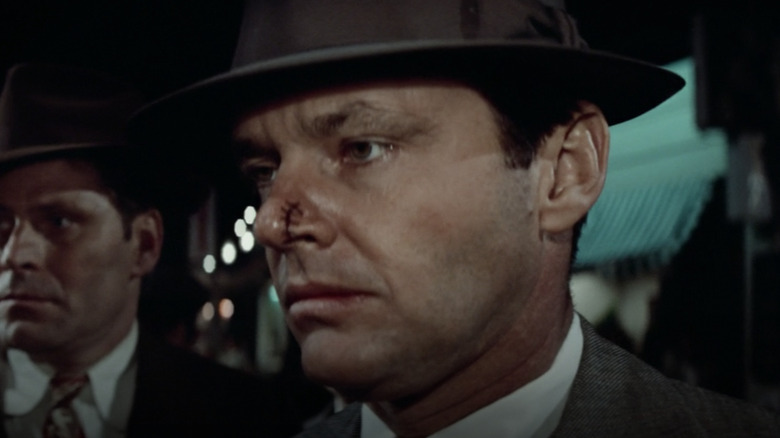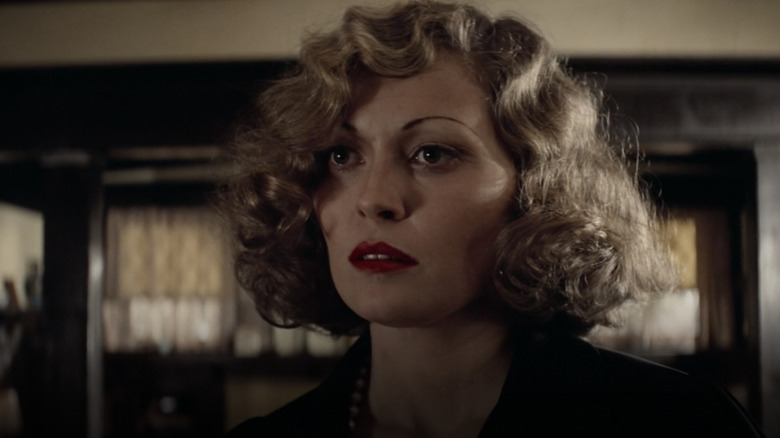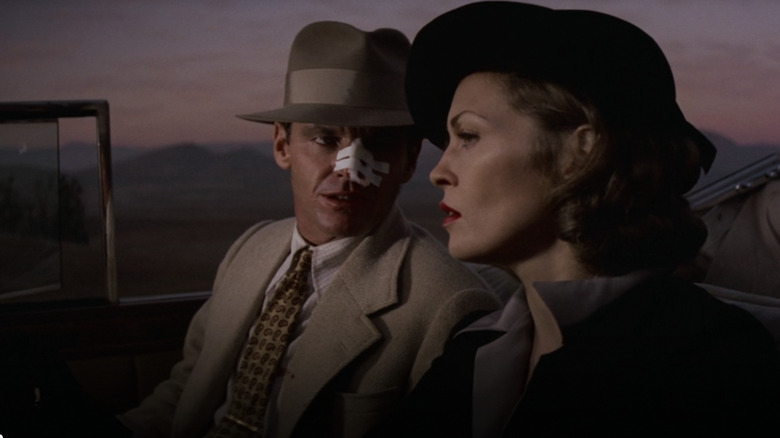Chinatown Ending Explained: Forget It, Jake
The films of the New Hollywood had a distinct way of leaving the audience on a total bummer. They could make you throw up your hands and think, "Man, the world's just bad, isn't it?" and somehow make that into a completely satisfying conclusion. It spoke truth to a world being upended, with figures of authority and the status quo constantly being challenged. Life has no happy ending, and the corrupt elite who pull the strings will get away with every bad thing they ever do. It may be depressing and horrific, but that is just the way it is. You just have to figure out a way to move on with your life and hope tomorrow is better than the day you just had. In other words, "Forget it, Jake. It's Chinatown."
Roman Polanski's neo-noir "Chinatown" better encapsulates that desperation than any other film of the era, something I am not happy to say about a movie made by a sex criminal. Just those five words, "Forget it, Jake. It's Chinatown," crystallizes that feeling perfectly. It is a testament to the screenplay from Robert Towne — the screenwriter of "The Last Detail," "Mission: Impossible," and uncredited work on so many masterpieces — that this turn of phrase could speak volumes. It is up there with the greatest final lines in cinema history, alongside "I think this is the beginning of a beautiful friendship" and "Shut up and deal." So let's dig into what makes that line so potent
In chaos, the powerful still win
Private investigator J.J. Gittes (Jack Nicholson) becomes embroiled in life of Evelyn Mulwray (Faye Dunaway), the wife of the head of the Los Angeles Water and Power Department and daughter of her husband's former business partner. Her husband ends up dead, and Gittes is not convinced that he accidentally drowned. He comes to discover that Los Angeles' water has been secretly been withheld and dumped into the ocean in order to dry up the land. This has allowed Eveylyn's wealthy father Noah Cross (John Huston) and company to buy up land cheaply, develop it by irrigating the land properly, and expand the city of Los Angeles. And I haven't even mentioned the complicated relationship between Evelyn and her sister Katherine (Belinda Palmer), as she is not just her sister. Katherine is also Evelyn's daughter, as she was raped by her father when she was 15.
This all comes to a head in Chinatown, Gittes' former stomping grounds when he worked for the District Attorney. Evelyn ends up shot and killed in her car (not the first time that's happened to a Faye Dunaway character), with Katherine screaming beside her and being taken away by their father, whom Evelyn had wanted eliminated from their lives. All Gittes can do is look on at the carnage in disbelief, prompting one of his associates to utter that iconic final line.
A desperate woman with a child she loves, who has been longing for freedom from her abuser's clutches, is killed. A wealthy man of power gets to continue pillaging the world for his profit and is able to keep the girl he was rightfully denied his whole life. A child just saw her mother's head blown off, and the police do not seem all that interested in getting to the bottom of why all this happened. What can anyone do in a situation like this? So much is happening around you, and you are powerless to stop it. "Chinatown" is not the story of one brave man saving the day. It is the story of a man seeing that even if you try to help a situation, pain will still inevitably occur. One person can't change everything.
'Sometimes you're better off not knowing'
Jack Nicholson's J.J. Gittes first enters the world of the Mulwray saga as a patsy, with a woman impersonating Evelyn hiring him to investigate her husband's possible infidelity. When she says she still loves her husband, Gittes suggests not going forward with the investigation and says, "Sometimes you're better off not knowing." While this scene is a sham, that line says quite a lot about the film's view on the world. You could rephrase it as, "Ignorance is bliss." Knowing so much about the world is an undeniably important thing, sure. If you are really observant, you can improve the way you interact with your fellow person and better each other's lives. However, knowledge also puts a tremendous burden on you.
Going through life is an enormously challenging task. If you don't know what is making your life difficult, you can chalk it up to fate or chance, perhaps with the ability to easily shrug it off. If you do know the ins and outs to your world and understand exactly what and who is bringing you pain, it makes it all the more frustrating and dispiriting when you have no ability to change it. The only thing you can do is bear it and move ahead. Otherwise, you perish.
The noir genre has never been one full of uplifting stories. In the Hays Production Code era, noirs were one of the few ways you could have complete downer endings to your films. Using the framework of a film noir in the even more distressing era of New Hollywood piles hopelessness on top of another heaping pile of hopelessness. No wonder "Chinatown" is the perfect vehicle to express this kind of chaos.
We also must not forget that this film comes just a few years after Roman Polanski's wife Sharon Tate was murdered by the Charles Manson gang. This was a someone whose life had been turned upside down while the world itself was turning upside down. Each of Polanski's films after that horrific incident, particularly this and his adaptation of "Macbeth," are consumed by this dread and view of a morally vacant world, a totally understandable feeling for someone in that position. If there was anyone who could bottle that tone into a film perfectly, it would have been Polanski at that time.
"Forget it, Jake. It's Chinatown," still rings incredibly true today, as officials and people in power feel just as craven to climb the ladder than ever before. You turn on the news, get on social media, or anything else and you will see endless stories of carnage, corruption, and negligence. Doom scrolling is basically an American past time at this point, but for us, simply observing the troubles in the world without action no longer is an acceptable choice. Thankfully today, there are voices willing to say that change is possible, fighting tooth and nail everyday to improve our broken world. Forgetting it may be what we want to do and would help preserve our collective sanity, but we no longer can forget. We know too much about the world, and all we can do now is try to change it.


